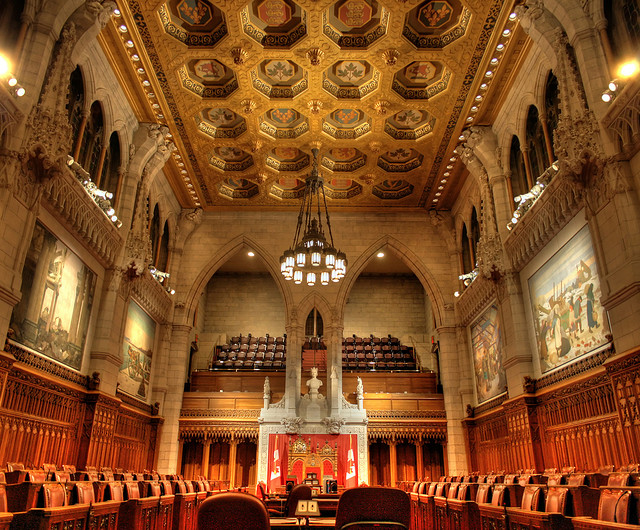After years of relative obscurity in the splendour of the Upper Chamber, Senator Linda Frum’s plunge onto the national stage last week was odd, to say the least.
Frum’s adamant insistence — at a Senate hearing and later in a series of well-publicized Twitter exchanges — that Elections Canada should not encourage people to vote sounded so out of sync with widely-held democratic principles that it appeared mystifying.
Indeed, it only made sense when you realized she was inadvertently revealing how deeply she and other Harperites mistrust the public at large, and how much they fear entrusting the vote to those beyond the Harper base.
Encouraging the vast horde of Canadians to vote is the last thing they want.
Frum’s strange remarks managed to capture the deeply anti-democratic tendencies of the Harper Conservatives.
Of course, the intense scrutiny surrounding Stephen Harper’s new election bill has brought these anti-democratic tendencies into sharp relief, as a number of knowledgeable individuals have noted that the bill would likely suppress voting by more than 100,000 marginalized people, while doing little to clamp down on the really serious problem of dirty election tricks witnessed in the robocall scandal.
To get an overview of the anti-democratic arc of this government, it is useful to view this new attempt to rig the election rules alongside the government’s other mainstay of anti-democratic action, namely its attempt to suppress dissent.
The Harper team is notorious for muzzling government scientists, cutting funding to groups insufficiently aligned with its agenda and launching an aggressive campaign of tax audits of environmental charities criticizing government policies.
And the scope of the Harper government’s net of tax audit intimidation may be bigger than previously suspected.
I happened to learn last week that the United Church, a bedrock Canadian institution, has been subject to some intense auditing.
I heard this from members of Toronto’s Trinity St. Paul’s United Church congregation, including opera singer Mary Lou Fallis, a recipient of the Order of Canada. Fallis says that participants at a recent Church event defending public health care were quietly warned not to say anything directly critical of the Harper government due to fears over the audit.
This in Canada?
The United Church, with more than 3,000 congregations across the country, has a long tradition of social justice advocacy, including taking stands that would annoy the Harper government, such as supporting First Nations in their opposition to the Enbridge Northern Gateway pipeline, and opposing Israeli occupation of Palestinian lands.
Using tax audits to intimidate opponents is of course reminiscent of Richard Nixon, who secretly tried to get the U.S. Internal Revenue Service to carry out harassing audits of political enemies.
Harper appears to have essentially done the same thing — without the secrecy. In 2012, the Harper government announced it was allocating an extra $8 million for auditing charities to ensure they were following the rules governing political advocacy. It also accused some environmentalists of being “extremists” funded by “foreign money,” and it revised anti-terrorism legislation to add environmental groups as a potential threat.
Accused of targeting political enemies, then-finance minister Jim Flaherty replied: “There are some terrorist organizations, there are some organized crime organizations, that launder money through charities and that make donations to charities.”
Of course, the Canada Revenue Agency (CRA) has the legitimate authority to conduct audits to ensure groups are following Canadian tax law.
But the large number of audits of leading environmental groups — including the David Suzuki Foundation, West Coast Environmental Law and the Pembina Foundation — has led to suspicions the Harper government is using the audits to harass and intimidate some of its most effective critics.
In the United Church case, Church financial officer Erik Mathiesen is careful not to make accusations, suggesting that an audit may have been “due.” But he acknowledges that there was a “surge in audit activity,” with three different branches of CRA suddenly going after the Church in the same time period.
That could be random. Or as James Bond noted in the ’60s classic Goldfinger, once is a happenstance, twice is a coincidence, three times is enemy action.
I’ve always found it odd when commentators use the word “populist” to describe the Harper Conservatives.
While they try to make their policies appear beneficial to working-class voters, Harper and his team are deeply elitist.
It’s striking that some of the leading figures pushing the government’s anti-democratic agenda are unelected, Harper-appointed senators from prominent, wealthy families who use the gilded Upper Chamber as a pulpit for trashing the democratic rights of less privileged citizens.
Nicole Eaton, who married into the department store fortune, launched a Senate inquiry into the role of foreign money in environmental charities, headed by people like David Suzuki, who, in a nationwide CBC poll was voted one of the greatest Canadians of all time.
And now we have Linda Frum — also from a wealthy, prominent family and appointed to the Senate after her brother played a pivotal role in the unite-the-right movement that brought Harper to power — accusing the chief electoral officer of a “conflict of interest” for promoting a program encouraging youth to vote.
It used to be that members of patrician families occupied their time with harmless high-society events. Now, it seems, they’re drawn to suppressing democracy.
Whatever happened to the debutante ball?
Winner of a National Newspaper Award, Linda McQuaig has been a reporter for the Globe and Mail, a columnist for the National Post and the Toronto Star and author of seven bestsellers, including Shooting the Hippo: Death by Deficit and other Canadian Myths and It’s the Crude, Dude: War, Big Oil and the Fight for the Planet. Her most recent book (co-written with Neil Brooks) is The Trouble with Billionaires: How the Super-Rich Hijacked the World, and How We Can Take It Back.
This article is reprinted with permission from iPolitics ![]()
Photo: Intiaz Rahim/flickr




